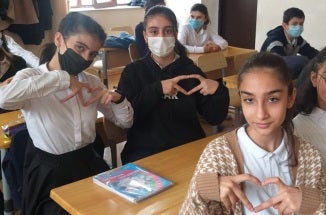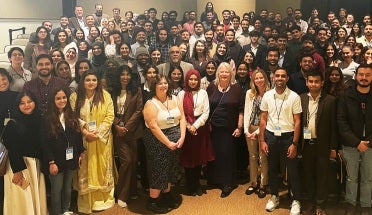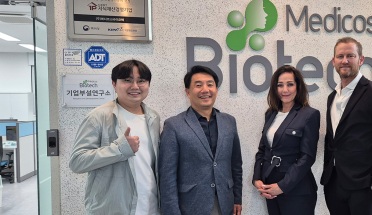
Anti-Bullying in Azerbaijan: Collaboration Grows from Professional Fellows Program
- May 6, 2022
- Global Customized Programs
- by Alex Briseño
R. Keeth Matheny, a social-emotional learning (SEL) instructor, author and speaker, was launching SEL programs all over the United States at the same time Zahida Israfilova, an advisor for the State Committee for Family, Women and Children Affairs in Azerbaijan, was searching the globe for anti-bullying programs.
The two hadn’t met, but that would soon change after Matheny was selected to host Israfilova for an international fellowship through the Professional Fellows Program (PFP).
Implemented by American Councils and sponsored by the U.S. Department of State’s Bureau of Educational and Cultural Affairs, PFP is a reciprocal global exchange program designed to build leadership capabilities, professional skills and sustainable partnerships between emerging leaders (ages 25-35) from international countries and the United States. The program offers intensive fellowships with nonprofit organizations, private sector businesses and government offices across the U.S. for a uniquely tailored developmental experience, and invites the creation of a reciprocal project in participants’ home countries or communities.
The Global Customized Programs (GCP) unit at Texas Global received a grant from the State Department to partner in hosting the PFP Governance and Society Fellows from Eurasia. This paved the way for The University of Texas at Austin to virtually implement the PFP project in 2021 for the first time, cracking open the door for Matheny and Israfilova to connect and begin collaborating from across the world.
Lake, River, Waterfall: The Landscape of SEL
Through PFP, the 2021 fellows at UT Austin worked with the UT Law School, McCombs School of Business, City of Austin, International Accelerator, Austin Chamber of Commerce—and, in Israfilova’s case, with SEL Launchpad.
Matheny—known as “Coach Rudy” in the field—runs SEL Launchpad, which has instituted programs with 418 schools in Canada, Mexico and the U.S. As a first step of the fellowship, Israfilova began attending the virtual SEL workshops.
“I participated in both kinds of sessions, for U.S. educators and students,” said Israfilova. “What I liked most was the relaxed atmosphere. Participants did not feel like they were in a formal training session. I would like to note Rudy's positive attitude and use of interactive games during the sessions.”
The goal of teaching SEL is to equip students with the skills of active listening, conflict resolution, emotional management, help-seeking and empathy.
“SEL is a proactive set of skills and strategies that can help address many issues in schools, including bullying,” said Matheny. “This work is especially critical right now, given the worldwide youth mental health crisis, and these skills can be significant protective factors.”
Referring to the overall climate for this work, he continued, “The need for social and emotional learning is intense, and the potential is immense”—specifically as it relates to younger generations. “My focus for the last four years has been on how SEL is connected to students’ mental health. Right now, we're in an incredibly huge mental health crisis. What can we do to better support students and staff?”
Zahida, who works also with the Ministry of Education, was focused on addressing bullying in Azerbaijani schools, though she had little information on SEL or the advantages it could offer to schools.
“When [Zahida] first talked to me, what she really wanted to talk about was bullying,” said Matheny. “They had a lot of issues with bullying, and asked if I could help by giving some information to address that.”
Matheny envisions social interactions as a landscape with a lake, which feeds into a river that eventually flows into a waterfall. For him, it’s all about teaching upstream.
“The lake is proactive education; the river is where people might be struggling with a challenge because they don’t have a skill; and the waterfall is a crisis,” he said. “Bullying is at the crisis level.”
Rather than trying to solve the problem at the “waterfall,” Matheny teaches skills at the “lake,” which creates room for cultivating empathy before a crisis arises.
“Before you do something violent to someone, you first ‘other’ them in your mind. [You think] they are not deserving of what you have because they're 'the other’ and they're not like you,” said Matheny. “This is a psychological thing that happens; it’s related to all kinds of horrors in our world.”
He continued, “The more I can empathize, the more I can see myself in another person, the more likely I am to treat them the way I want to be treated. It's true that the more time you spend with somebody, the more likely we are to see our shared humanity, which is a kind of full circle as we partner with other countries and cultures.”
Bringing SEL to Azerbaijan
As Israfilova learned more about SEL, she started to see the potential role it could play in Azerbaijan.
After completing the virtual fellowship, she and Matheny seized an opportunity to collaborate on a reciprocal project, another component of the PFP fellowship. The project, “Promotion of Social-Emotional Learning Among Azerbaijani Educators,” aimed to conduct virtual workshops with Azerbaijani educators, who could then begin applying SEL techniques in schools.
Initially, Israfilova wanted school psychologists and counselors in Baku, the capital of Azerbaijan, to engage in the SEL training. However, she also wanted this information to be accessible to educators, members of the Ministry of Education and students.
“Overall, we held three online sessions, where educators learned about the importance of SEL, its benefits for students and schools, and the role of SEL in bullying prevention efforts,” said Israfilova. “Besides that, it helped educators to understand what SEL [does] to foster a better classroom learning environment for their students.”
Matheny and Israfilova then led sessions for students, witnessing firsthand how they interacted with the material.
“I had many tears in my eyes,” said Matheny. “The real powerful moment was when I trained the teachers on how to teach empathy. A teacher left that workshop and taught that lesson to her kids the next day. To see that you can make a difference for kids thousands of miles away in a different culture is beautiful.”
After the training, Israfilova said more than 95 percent of the participants left positive feedback and expressed interest in continuing SEL training in the future.
“I believe that developing social and emotional skills and positive attitudes toward ourselves and others is essential,” said Israfilova. “This will result in a supportive, trusting school environment where students feel safe and thrive, and will also reduce bullying issues in schools.”
With all of this work being volunteered for no pay, Matheny says the real fulfillment comes from learning about Azerbaijani culture and making a difference by exposing SEL to schools across the world.
“It’s a spark,” said Matheny. “You’re lighting a spark with key educational stakeholders and decision makers, showing that this is a paradigm shift in education. We need to think of students not just as stuffing them with information, but also that it’s not just the brain that comes to school: It’s a whole child, and we need to educate that whole child.”



